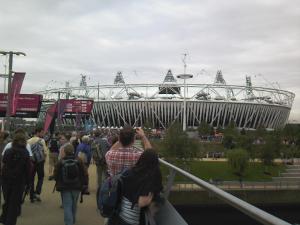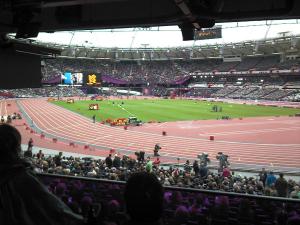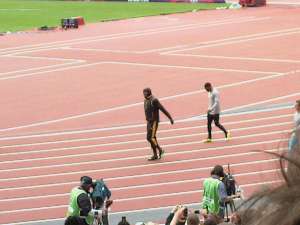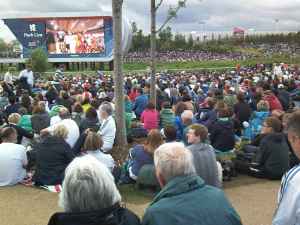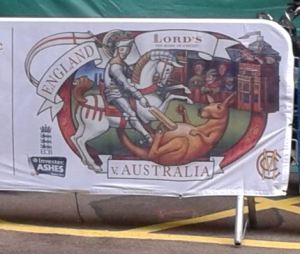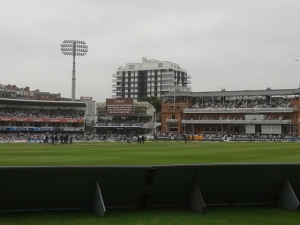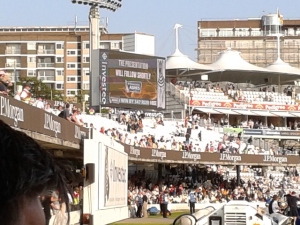“Has it really been a year?” seems to have been the general theme around this weekend’s Anniversary Games. It does seem ridiculous that one year ago tonight, the soon-to-be Sir Bradley Wiggins, fresh from Tour de France glory, rang the bell to get Danny Boyle’s amazing opening ceremony underway and the Olympics gripped a large proportion of the British public in a way I don’t think anything ever has before. Seeing athletics take place once more in the Olympic Stadium brings back so many fond memories of that golden summer, which partially inspired me to start this blog. What better time, then, to bask once more in Britain’s golden summer and think back to my own Olympic experience?
Showing rather less foresight than usual, I hadn’t actually applied for any tickets and was greatly indebted to my friend Mark for his offer of a spare to see a morning athletics session in the Olympic Park. I’d resolved in advance to watch as much of the action as I possibly could, even taking the second week off work to do so. Despite missing so much of the live daytime action of the first week, I’d still managed to keep in touch with what was going on, even popping over to the canteen to see Wiggo cross the line to win time trial gold. But there’s nothing quite like seeing events unfold live, and with the Team GB gold-rush well underway, I spent a large chunk of my free-time welded to the sofa, watching one sport on the TV while keeping tabs on one or more in split-screen on the laptop. The middle weekend was especially incredible: triple gold in forty-five minutes at the athletics, Andy Murray thrashing Roger Federer to win the tennis and Ben Ainslie taking his fourth successive gold in the sailing amongst others. The latter demonstrated how even sports which I would never normally consider watching, and which don’t especially lend themselves to the casual viewer, become essential viewing once there’s a bit of home interest.
With my appetite truly whetted, the second Tuesday saw me up bright and early for the trip into London. Sharing a tube train with one of the much-celebrated Gamesmakers, there was the unusual sight of people conversing happily with complete strangers. This particular lady, it emerged, was doing seventeen-hour days every day looking after the entire Bahamas team (“lovely people”) and having the absolute time of her life. Meeting up with Mark at St Pancras, a short trip on the Javelin train and a brief stop at Westfield preceded arrival at the Park itself. Given the pre-Games G4S debacle, I must confess to a little unease about the security arrangements, but the army boys were a welcoming and very reassuring presence on the gate. With plenty of time before the start of the athletics, we took the opportunity to have a good wander round and get plenty of photos of the different venues, some now gone for good. As many people commented at the time, it was like being at a giant sports theme park, so many different sports and people of all nationalities in such a well-designed and beautiful setting.
Taking up our seats in the stadium, we found ourselves towards the back of the lower tier, in front of the 200 m start. Just as well, since the highlight of the session was the appearance of Usain Bolt for the heats. He made it look ridiculously easy, gliding through the first half before practically walking through the second. The stadium was, of course, full to the rafters, with a resulting wave of sound rolling around as the longer-distance races took place. We couldn’t even be disheartened by a rare blip for the home team, British fortunes not going terribly well as it turned out: Philips Idowu and Goldie Sayers, both clearly injured, failed to qualify for their triple jump and javelin finals. Never mind: news came through that the Brownlee brothers had taken gold and bronze in the triathlon.
With Mark heading for home after lunch (this was his second visit out of three to the Park), I decided to make the most of my one day by staying to soak up as much of the atmosphere as possible. After another wander round and the purchase of a Team GB t-shirt, I headed to the big screen to watch some more action. Eventually taking a seat in the packed arena, the crowd celebrated gold in the team dressage before a thrilling session in the velodrome. Laura Trott, one of the stars of the games for me, took gold in the omnium while Victoria Pendleton went into retirement with a silver. Last and very definitely not least, Sir Chris Hoy took his final bow in the keirin. It looked as if he might go the same way as Pendleton, but a massive effort on the final bend saw the Scottish titan to a deserved final gold and send us all into raptures. With that, it was time to go, and I headed off out of the Park towards West Ham. Rather going against the grain, a Gamesmaker directing the human traffic from a high-chair used his megaphone to proclaim “I’m supposed to pretend that I like you, but I don’t really”. It must have been a long day. I must admit to huge admiration for the volunteers and their efforts, most of whom were presumably sports fans themselves. Signing up with no knowledge of where they’d be posted or what they’d be asked to do, how much of the sport did they actually get to watch? Imagine being posted to Heathrow airport or having to drive people around London all day.
One year on, there’s much talk of “legacy” and whether the Games really did “inspire a generation”. It will be many years before we can really know the answer to that question, but I’ll always remember August 7th 2012 as one of the best days of my life. Seeing Mo Farah and Usain Bolt win again on the same track brings home what a special time it was for our country. That I’ll probably never see another home games in my lifetime is not a cause for sadness: in this digital age, all it takes is a few clicks of a mouse or remote control to relive it all over again. It was ours, it was fantastic and the flame still burns.

